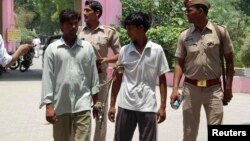Indian federal investigators will not oppose applications for bail by five men arrested over the murder of two teenage girls hanged from a tree, a source familiar with the case said, paving the way for the suspects' release.
The killings in May in India's most populous state shocked the world and stoked political tension between newly-elected Prime Minister Narendra Modi and state officials over the investigation of the case.
Initial inquiries had suggested the two cousins, aged 14 and 15, and belonging to a low-caste community, were raped before being hanged from a mango tree, highlighting a breakdown in law and order in northern Uttar Pradesh state.
The suspects, three brothers and two policemen, are being held in jail in the town of Budaun, 198 km (123 miles) southeast of the capital, New Delhi. They become eligible for bail upon the expiry of a 90-day period for authorities to press charges.
That deadline passed on Tuesday for one of the suspects, while for the others it falls on Thursday.
The decision by the Central Bureau of Investigation (CBI) not to oppose bail follows a forensic report last week that ruled out sexual assault, and another preliminary report by a medical panel that reached a similar conclusion.
“The CBI won't oppose a bail plea if it comes ... initial reports do not say that they are likely culprits,” the source, who had direct knowledge of the CBI probe but sought anonymity in the absence of authority to disclose details, told Reuters.
“They have pointed out inconsistencies in the initial post-mortem and have called the doctors and staff for further consultation,” the source added, referring to the medical panel.
No lawyer has so far been hired by the suspects to post bail. Reached by telephone through a neighbor, the mother of the three brothers who are suspects said she was satisfied with how the investigation was going.
“We are short of money so we have not talked to lawyers yet,” she said in response to questions relayed by the neighbor. “When money is arranged we will try to get bail.”
Investigators have not been able to substantiate testimony against the suspects from the girls' relatives. While no charges will be filed at this stage, the suspects have not been declared innocent and the CBI probe will continue, the agency has said.
In a speech this month, Modi said India was shamed by increasing reports of sexual violence against women and girls.
The number of rapes reported rose 35.2 percent to 33,707 in 2013, with about a tenth of those reported in Uttar Pradesh, data from the National Crime Records Bureau showed.
India stiffened its rape laws after the gang-rape and murder of a 23-year-old student on a moving bus in New Delhi in 2012 sparked street protests nationwide.
Still, sex crimes against women remain widespread. Females from poor and marginalized communities are often among the victims, activists say, while many such crimes go unreported or are not properly investigated.
Honor killings?
Archaic practices such as lynching women accused of witchcraft, honor killings and dowry murders persist in India because they remain socially acceptable, a United Nations official said last year.
Before the CBI probe, the Uttar Pradesh state police suggested the girls could have been victims of so-called 'honor' killings. A senior state police officer reiterated that stance last week.
Honor killings, a crime usually seen in rural and conservative parts of India, target individuals considered to have brought dishonor to their families through actions relatives believe have damaged their reputation.
The victims' families have consistently denied any role in the killings, and say they will personally oppose bail applications by the suspects.
“Everything is a lie. If the boys are let off, we will fight,” the father of one of the victims told Reuters by telephone. “We can also commit suicide, we can do anything.”





